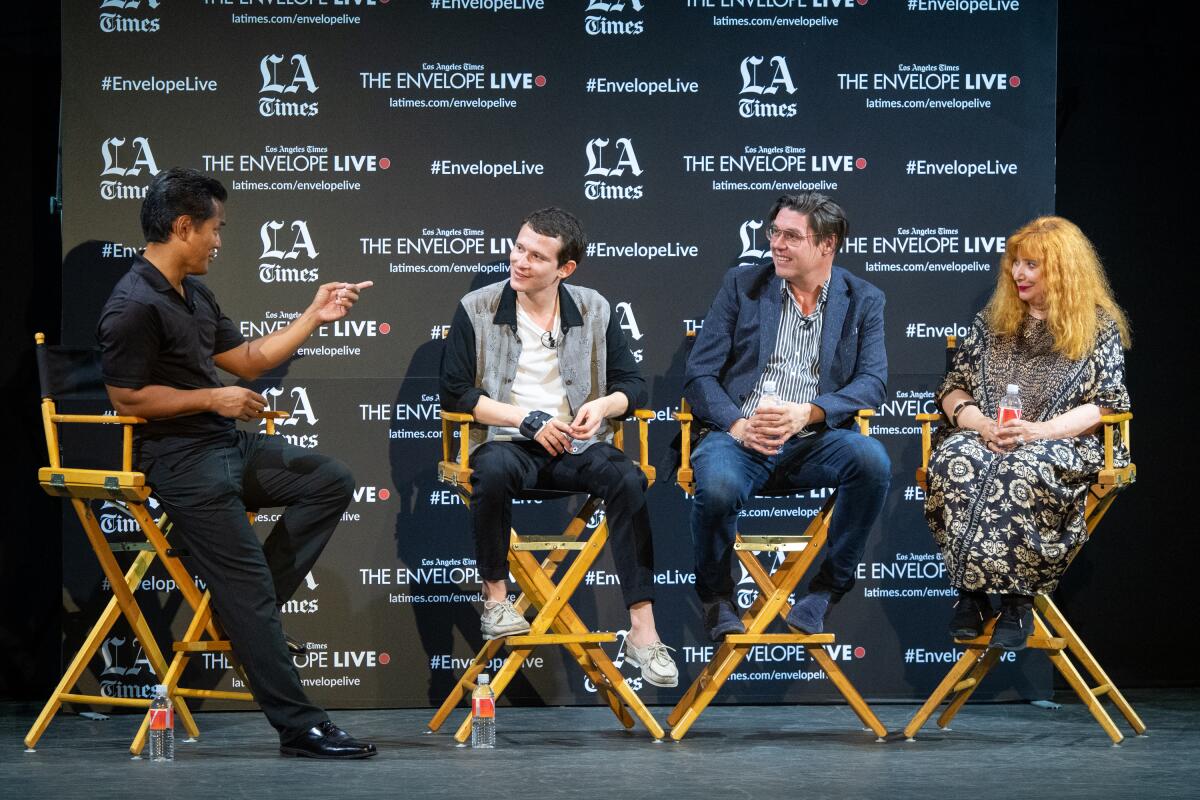Actors in the Swiss Oscar submission ‘Wolkenbruch’ share the loving dynamic of their mother-son characters

- Share via
Swiss actor Joel Basman, in costume as a young Orthodox Jewish man, found some of the meanest streets to hang around were in Zurich … in the Orthodox Jewish community.
“Some Jewish areas, the Shabbat, you’re not allowed to work, of course, you’re not allowed to drive a bicycle. You’re not allowed to smoke, or anything. And I’m just standing on my waiting position, on my bike, smoking, with my phone. In this costume,” he said. “And the mom crosses the street, and she’s like [seething voice], ‘Where does he come from? … I’m gonna call his mom.’
“I even waved to friends; they didn’t wave back, from far away.”
“Wolkenbruchs wunderliche Reise in die Arme einer Schickse,” the film formerly known as “Wolkenbruch’s Wondrous Journey Into the Arms of a Shiksa” and now called “The Awakening of Motti Wolkenbruch,” is a breezy rom-com glimpse into a world rarely seen on screen — an Orthodox Jewish community in Switzerland. It’s also that country’s official submission for this year’s best international feature film Oscar. Basman, who won the Swiss Film Award for his lead performance, director Michael Steiner, and Inge Maux, who plays Motti’s mame, joined the Los Angeles Times’ Michael Ordoña for an Envelope Live Screening Series Q&A recently at the Montalbán in Hollywood.
Three-time Swiss Film Award nominee (winner for 2005’s “Mein name est Eugen”) Steiner isn’t Jewish, but has known the author of the novel and screenplay, Thomas Meyer, for more than 20 years. Despite the detail in the book and film, such as a contemporary style of eyeglasses causing sturm und drang in a decidedly traditional family, Steiner says Meyer didn’t grow up religious.
“He was saying it was not connected to his mother, his Jewish mother,” Steiner said, then added, laughing at his friend: “Then when the movie came out ... suddenly it was all connected to him.”
The community wasn’t totally alien to the filmmaker, however.
“I actually lived in the area for over 10 years, and above me there was an Orthodox Jewish family. And sometimes their little kids plugged out their electricity on Friday evening,” Steiner said. “So they knocked on my door, they needed someone to put back their electricity. They called me ‘Shabbos goy.’ I didn’t know they had a word for me, but later on I found out I had a word and I had a function. That was my first glimpse into their world.”

Director Michael Schneider and star Joel Basman talk about Zurich’s Orthodox Jewish community.
Basman is Jewish, but, like Meyer, was not raised religiously. He and Steiner credited one of Basman’s friends from the community for checking their accuracy on details such as correcting when books were turned the wrong way on the set’s shelves.
“He was really [helpful] to me because he spoke Yiddish perfectly. I don’t. I speak Hebrew, but Yiddish is another thing,” Basman said. “All these small things … I asked him, ‘Give me the night prayer,’ and he sent it to me on WhatsApp.”
Working with Yiddish was a welcome challenge for the filmmakers, though they did try to lower the degree of difficulty where they could.

Director Michael Schneider relished the challenge of using Yiddish, but also reduced the dialogue where he could.
“Basically, we reduced the Yiddish to, like, 500 words. Then we put it in the right grammar,” Steiner said. “That was a really beautiful thing, to work on that language, because that language is not often heard. It’s very related to Swiss German, but the grammar is completely different. It was hard to do it but also lots of fun to exercise these lines in the correct Yiddish. As soon as the movie came out, the first screening it had in the U.S., I think it was in Chicago, I heard that people who speak Yiddish really understand.”
For the key role of Motti Wolkenbruch’s mother, or Mame, the film landed veteran Austrian actress Inge Maux, who won both the Austrian Film Award and German Screen Actor ensemble award this year for “Murer: Anatomie einese Prozesses.” Maux said the role came naturally to her.

Inge Maux of Swiss Oscar entry “The Awakening of Motte Wolkenbruch” says she has a Yiddish soul.
“My soul and my heart are Yiddish. My mother and my grandmother had hidden it from me and they got frightened when I’d sing Jewish songs. [The filmmakers] gave me as a present a Yiddish life, and a family. Because in reality I only have two Chihuahuas and no children,” she said, chuckling. “So my heart is completely on this guy,” she said, extending her hand toward Basman, “this wonderful actor.”
“My heart is on you!” Basman responded, taking that hand.
“From the very first moment, he makes me cry, and the tenderness, and all the motherly feelings, which I’d never had — except for my dogs,” she said, as the audience roared. “Really, the whole part is really the greatest gift of my life. Indeed. Thanks.”
Steiner reached over to embrace her, which she returned with a kiss on his cheek.
To see more Envelope Live videos, go to latimes.com/envelope
More to Read
Only good movies
Get the Indie Focus newsletter, Mark Olsen's weekly guide to the world of cinema.
You may occasionally receive promotional content from the Los Angeles Times.










